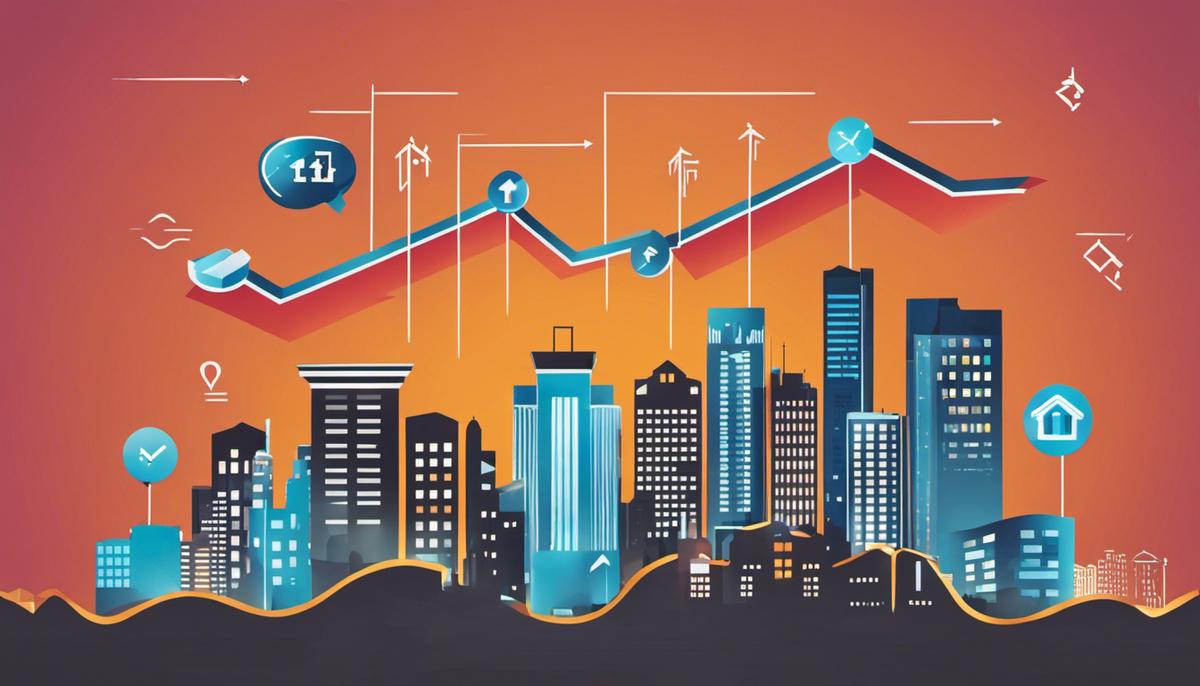In the journey of adult financial planning, one of the most pivotal decisions to be made is related to housing. Left to grapple with the weighty decision of buying a house or opting for rented accommodation, it becomes crucial to carefully analyze multiple factors and scenarios. This discussion aims to offer an in-depth understanding of market implications, economic advantages and disadvantages, and lifestyle considerations associated with both renting and purchasing a property. From the dynamics of the real estate and rental markets, interest rates, cost analysis, to the potential impacts on daily life—both approaches are dissected thoroughly to offer a comprehensive guide.
Table of Contents
Market Implications for Buying or Renting
The house you live in: To Buy or Rent? The Current Market Perspective.
In the arena of life’s big decisions, the question of buying versus renting a home is a heavy hitter. The choice is pivotal, impacting not just financial footing, but also lifestyle and even personal identity. The current nuances of the market often tip the scales towards one or the other, and an understanding of these subtleties may help streamline your decision.
The dynamics of the real estate market are ever changing, influenced by several overarching economic factors such as the job market, interest rates, and inflation, as well as macro factors like population growth and urbanization trends. Recognizing these patterns and approximating their continued orientation is crucial in making a wise choice between buying or renting.
One of the key factors determining the choice between buying or renting are the interest rates. Generally, lower mortgage rates make buying a home more attractive, especially in a burgeoning market. With the current outlook of a steady or declining interest rate, this consideration augurs well for those contemplating buying. However, ensure you lay out and analyze the full costs, such as property taxes, ongoing maintenance, and insurance before making a move.
Another angle pertains to the job market – factor in both its status and your personal employment security. A robust, burgeoning job market could mean there will be more people competing for housing, potentially hiking up rental prices. On the flip side, a trickle-down effect of an unstable job market can cause houses’ selling prices to dwindle, making home ownership a more appealing prospect. If your job is not tethered to a physical location, the impact of this factor may be less.
Now, let’s visit the elephant in the room: the COVID-19 pandemic. Shaking the very foundation of societal norms, COVID-19 has shifted the goal post on many fronts, including the real estate market. Remote work realities and safety considerations have seen people flocking to suburban and rural areas. There’s been an increased demand for home ownership, pressurizing the market and inflating prices. This “seller’s market” trend may stoke the appeal of renting, at least until the dust settles.
Urbanization and population growth trends also bob their heads into the equation. Cities constantly growing and evolving present opportunities for real estate investment, while areas with a stagnant or declining growth may offer less lucrative prospects for home buyers.
To sum, the decision between buying and renting in the current market is multi-faceted. It involves understanding economic trends, gauging personal job security, and acknowledging the influence of current societal upheavals. This scrutiny helps discern how these factors drive changes in the housing market, and subsequently, guide your decision on home ownership.
Remember, purchasing a house is more than just an investment – it’s a lifestyle choice. Similarly, renting might offer the flexibility that better aligns with life plans. So, as you ponder over this decision, stay informed and incisive. Make a choice not just for the profit and loss sheet, but also for the life you envision. The market theme song may ebb and flow, but your perfect home harmony can always hit the right note.

Economic Pros and Cons of Buying a House
The Fiscal Implications of Homeownership
Understanding the financial implications of purchasing real estate is crucial in current turbulent times. Diving into the fiscal advantages and disadvantages of buying a house allows people to decipher whether it will be a beneficial venture in the long run.
Commencing with the financial advantages, property ownership is an investment toward long-term wealth. It’s a tangible asset that retains intrinsic value, while offering potential appreciation over time. Furthermore, home equity – the difference between the mortgage balance and the home’s market value – grows over time, providing financial stability and a potential source of borrowed funds.
Aside from the potential for wealth accumulation, homeowners benefit from specific tax breaks. This can include being able to deduct mortgage interest and property tax payments from your federal taxable income, leading to substantial savings over the course of loan repayment.
Owning a house can also provide the inflation hedge. As the world grapples with economic uncertainty, hedging against inflation becomes critical to protecting wealth. Real estate is directly linked to rental income and replacement costs, both often rising with inflation, making property ownership an effective hedge.
Yet, every silver lining has a cloud. The existence of significant financial disadvantages to owning a house can’t be overlooked. The most glaring financial downside is the potentially high upfront costs. Down payments, closing costs, and moving expenses can be overwhelming.
Additionally, homeownership comes with the hidden costs like regular repairs, improvements, and ongoing maintenance. Unexpected expenses can crop up at any time – significant repairs like fixing a leaking roof or replacing an aging HVAC unit can take a huge chunk out of savings.
Also, real estate investments aren’t very liquid. Selling a house is a complicated process that takes time, often several months or more. With such substantial time investment and potential for fluctuating market conditions, quick access to the funds invested in property isn’t always possible.
Furthermore, the prospect of depreciating property value must be addressed. While historically the housing market trends upward, there’s no guarantee a specific house will increase in value. Various factors can lead to depreciation, leaving homeowners in a potentially precarious financial situation.
To encapsulate, real estate investment is by nature a calculated risk that hinges on myriad factors. Informed decision-making, grounded in an understanding of these fiscal advantages and disadvantages, ensures that the risk taken aligns with personal and financial goals. It’s crucial to consider the long-term financial commitment homeownership entails, and gauge every aspect of this investment with clear-eyed scrutiny. Owning a house isn’t merely a major financial decision, it’s a significant lifestyle choice that should be handled with the gravest care.

Economic Pros and Cons of Renting
Undeniably, renting is an increasingly popular choice, largely due to its flexibility and lower upfront costs – a significant advantage, particularly for younger individuals or mobile professionals.
Nonetheless, it’s paramount to discern the financial implications in order to make informed and economically sound decisions.
Examining the financial upshots of renting, one must highlight the fixed costs. Unlike homeowners, renters aren’t saddled with glum realities like surprise repair costs or unanticipated property tax increases. Instead, they enjoy consistent living costs, which can promote stability and long-term budgeting.
Additionally, renters aren’t directly subject to market fluctuations, a noteworthy boon in an unstable economy. While homeownerships can be beleaguered by property depreciation issues, a renter’s financial obligation ends with their lease, allowing them to weather market downturns with less exposure.
Yet, delving deeper into the financial implications, renters ought to remember they are funding somebody else’s mortgage, not their own. Renting doesn’t build equity, and each payment is an expense, not an investment in durable assets. Consequently, there’s no potential return on the horizon of a renter’s fiscal path – a marked contrast to the potential appreciation in homeownership.
Likewise, renters ought to consider the potential for annual rent increases, often driven by property value appreciation or living costs. These regular hikes can unnervingly disrupt budgeting and result in significant increments over time, a stark contrast to the predictability of a fixed-rate mortgage.
Moreover, renters face an elusive illusion of lower costs. Apparent savings might not be windfalls but lost opportunities to invest in other wealth-building avenues, like retirement funds or the stock market. It is therefore critical to examine the opportunity cost and evaluate alternative investments, considering the potential return against the fixed costs of renting.
Lastly, with renting, tax benefits are essentially nonexistent – a tangible disadvantage and a missed opportunity for potential fiscal relief. Homeowners often enjoy significant deductions on property taxes and mortgage interests, which can aggregate into substantial annual savings.
Indeed, the decision to rent is multifaceted, extending beyond mere financial calculations to include personal goals, lifestyle preferences, and even intangible aspects like happiness and peace of mind. But in steering clear from fiscal myopia, it’s crucial to keep perspective on the holistic financial implications of renting – from the short-term benefits of stability and lower upfront costs, to the long-term ramifications revolving around equity, value appreciation, and tax implications. Armed with these insights, prospective renters can navigate their way towards informed, savvy decisions that serve their unique contexts and visions.

Lifestyle Considerations: Buying Vs Renting
Stepping into the realm of lifestyle’s role in real estate, it’s central to acknowledge that everyone aspires towards a distinct quality of life. This vision often includes where we live and how that space suits our individual preferences.
The gradations between a renter and a homeowner’s lifestyle are conspicuous. Homeownership can often mean a boost of status, drifts of pride, and a sense of stability. Owning a home provides roots and a sanctuary that you can customize to reflect your personal aesthetic and needs. This is not just a house; it’s a canvas for life’s memories.
On the other hand, renting can often equate with liberty and flexibility; minimal responsibilities and the mobility to change locations, dwelling sizes, or styles according to evolving taste and needs. Renters don’t have to worry about the unexpected costs of repairs or maintenance – they merely pass it over to the landlord. And they’re freed from watching the housing market nervously, worrying about property tax hikes or value fluctuations. These factors can be invaluable for those who value a fast-paced or unpredictable lifestyle.
Yet, with this freedom and flexibility, there are trade-offs. Renters do not share in the potential financial gains of property ownership. They miss out on the opportunity of home equity growth and tax deductions available to homeowners. Additionally, they are often subject to annual rent increases and lack control over their living arrangements, which can disrupt lifestyle plans.
However, let’s consider this. Could the expense of renting be invested more profitably elsewhere, like the stock market? Possibly, if the would-be homeowner is also a savvy investor. Yet, this necessitates outpacing all the costs stacked against the renter – annual increases in rent, lack of tax benefits, and the opportunity cost.
When considering the lifestyle impact of buying vs. renting, it’s indispensable to assess lifestyle preferences. Some individuals are harmonious with permanency and stability, appreciating the rootedness that homeownerships bring, no matter the challenges. Others value flexibility, mobility, and minimal obligations, and hence find the notion of renting more appealing.
Finally, the intangible aspects. When one purchases a home, they’re not just buying a structure; they’re investing in a community. They’re considering schools, retail, amenities, cultural offerings, and the neighborhood vibe. A renter may also consider these elements but can easily change course without the financial implications of home sellers.
So, when it comes to influencing the decision to rent or buy, one’s lifestyle, personal goals, and preferences are key to the weighing scale. It’s imperative to remember – a house is a profound personal statement and a lifestyle proclamation. Therefore, it’s invaluable to make an informed, thoughtful decision that bears one’s lifestyle, financial capacity, and future objectives in sync. After all, home is not just a place, it’s a feeling.

Deciding whether to buy or rent a house is an individual decision influenced by one’s financial capabilities, lifestyle choices, and personal aspirations. While homeownership might resonate with those looking for stability and potential long-term financial returns, renting might just be the better option for those seeking flexibility and fewer maintenance responsibilities. This underscores the need to assess each aspect diligently and make a well-informed move in line with your unique circumstances and long-term goals. Ultimately, the choice between buying and renting should not be based merely on market trends or temporary conditions but be a thoughtful balance between your economic standing and quality of life.

Lian Jadepeak is a Chartered Financial Analyst (CFA) with a sharp acumen for investment strategies and financial markets. With a background in finance and years of experience in wealth management, Lian offers readers expert insights into smart investing, market trends, and portfolio management. Her clear, analytical approach helps demystify complex investment concepts for both seasoned and novice investors alike.

